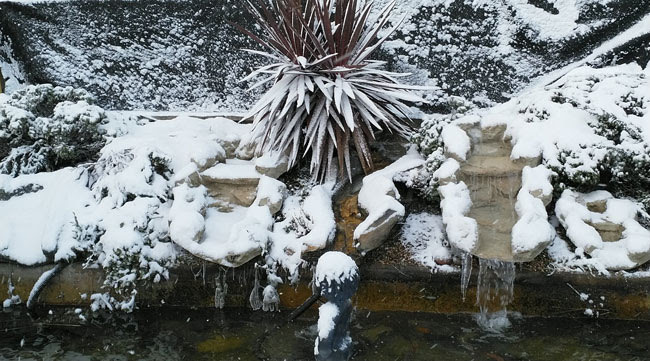3rd Dec 2021
In the wintertime there are certain things you can do to help your pond and its inhabitants get through the colder months and stay happy, healthy and safe.
Your fish will be a lot less active than during the warmer weather and will enter a torpid state when temperatures plummet to winter levels and will probably be congregating at the bottom of the pond. If you haven’t changed already you should be feeding them wheatgerm feed by now, and should stop feeding altogether when temperatures drop even further (see below). Other issues include a build-up of sludge through the winter.
See our Top 5 Winter Pond Tips to help ease you through the colder months:
- 1. Winter Clean Your Filter – Although cleaning frequency may reduce as your fish feed less and produce less waste, now is a good time to open up your filter and give it a good clean. You don’t want waste, leaves and other debris in your filter turning in to sludge and polluting your pond water. Rinse or Replace your foams and give the inside of the cage and pump a clean out with a hose pipe or even a light pressure wash.
- 2. Remove Leaves, Twigs and other Debris – These items need to be removed from the pond surface with Grabbers, Nets or even a Surface Skimmer. Failure to do this could mean this debris eventually sinks, rots and contributes to that dreaded pond sludge.
- 3. Fit a Pond Cover Net – There are various types of protective covers available for ponds, from simple nets to interlocking meshes. As well as protecting from leaves and falling debris, meaning that you don’t have to skim every day, these pond nets and covers will also offer some protection from herons and other predators.
- 4. Get a Pond Thermometer – Knowing your pond temperature is important at this time of year. A Pond Thermometer will give you an accurate reading of the actual pond water, which can often differ markedly from the surrounding air temperature. When your pond water reaches 5°C or less it’s time to stop feeding completely. While the temp is between 5 and 10°C if the fish still come to accept food then you should be feeding lower protein Wheatgerm Food.
- 5. Install a Pond Heater or Ice Preventer – During the winter it’s essential to prevent your pond from completely freezing over. A pond heater will keep an area of your pond surface free from ice which will allow harmful toxins to escape and let fresh, healthy clean oxygen in. If these toxins are not allowed a way out they will build up and adversely affect the health of your fish, possibly even resulting in some fish being lost!


